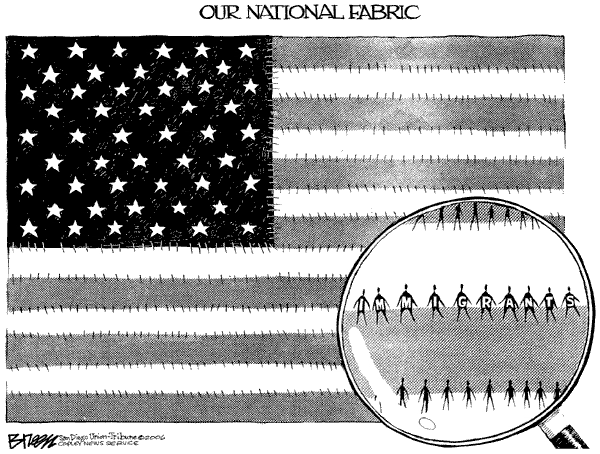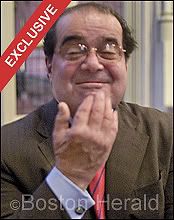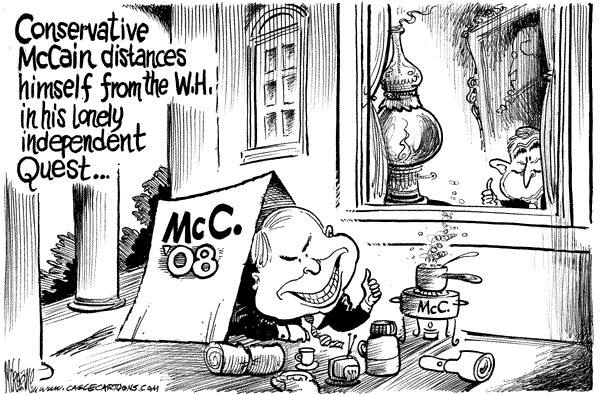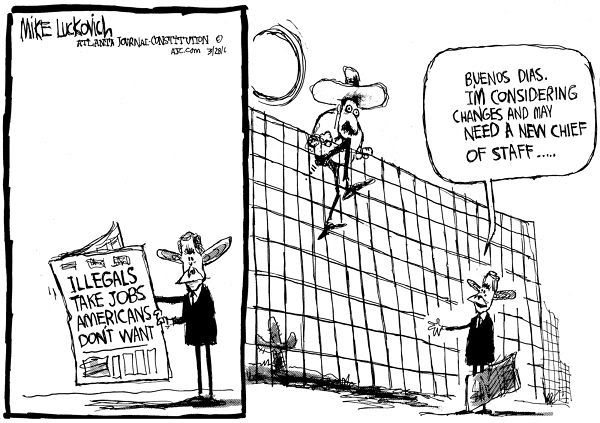A roundup on the censure hearings. Nothing was settled, the point was just to debate the resolution.
Also, it looked like all the Democrats but Leahy and Feingold ditched. Shameful.
Firedoglake has a detailed summary...
-
Censure Hearings, Part I -
Censure Hearings, Part II-
Censure Hearing, Part III -
Thoughts on the Censure Hearing Read those links for the full details (FDL's Christy Hardin Smith really did a great job in her coverage).
Here, in short (relatively), are what I think are the important things that came out of it... In his opening statement, Sen. Specter did lament how the media is virtually ignoring these hearings. It's a good point, but the media is too busy covering how Specter's party is debating what to do with all the Mexicans. Sen. Leahy was fiery in his statements against what the administration is doing and said he believes censure is an appropriate response. He immediately blows off the AUMF legal rationale, noting rightly that the President's behavior is not what Congress authorized and the President knows it. He notes the main purpose of that authorization was for the President to go after Osama bin Laden, which the President seems to have given up on anyway. Zing! He said what the administration has been doing "is 'Alice In Wonderland' gone amok".
Sen. Feingold opened first by reacting with confusion to Republican efforts to enact legislation to, in effect, legalize the President's behavior (more on this later). He said not only does this undermine their 'inherent authority' defense for the President, it is pointless since the issue here is the President violates the laws he does not like. Feingold notes that the system of three co-equal branches is in danger and unless Congress stands up against this, they are complicit in this behavior.
On the more apologist Republican side, Orrin Hatch was particularly odious in his defenses, with Jeff Sessions and Lindsey Graham close behind, and with the latter at least pretending to be agreeable to dissenting arguments. Sen. Hatch made no real effort to debate the resolution on its merits, simply being content with playing the wartime card. He said in such times we should not "weaken the Commander-in-Chief". Hatch also used the false argument that is about punishing the President for fighting the war on terror. Sen. Sessions basically made the same argument, stating that the national uproar over this has died down anyway, that we need to spy on Al Qaeda (as if anyone questioned that), and how censure would endanger our troops. He also managed to say with a straight face, "Our President is an honest man. He is a candid man.", something I'm sure most Americans would disagree with. Sen. Graham said he understands why this debate is important, but that censure isn't constructive and that Congress would be better served trying to work with President on this matter. He ignores the unpleasant fact that the President is wholly uninterested in cooperating with them on this.
The witnesses who did not support censure (Prof. Robert Turner, Lee Casey, John Schmidt) basically all made the same argument- inherent constitutional authority- with different examples. Turner was the most extreme, stating the President needs to regain the powers taken away in the post-Nixon, post-Vietnam era (and gee, I wonder why presidential power become an issue then?). He even said at one point that who needed to be censured was the Congress that originally passed the FISA law for attempting to undermine the President. Ignore that that was 30 years ago and the law has worked fine since then (Leahy noted at one point that the Justice Department even bragged in 2002 about how well FISA works). The others just talked about inherent authority and foreign surveillance, ignoring the domestic aspect of the wiretapping that has sparked this debate.
Sen. Leahy had a fantastic comeback on the inherent authority argument, which I must highlight here. He noted that while the President may have the authority to gather intelligence, Congress has the power to regulate the means. That's a key point.
The witnesses in favor of censure were former Nixon counsel John Dean and constitutional scholar Bruce Fein. Dean used his firsthand experience with executive overreach and presidential wrongdoing to speak about the dangers of what can happen when a President pushes his power to the limits. A transcript of some of his statements can be found-
here.
Fein provided the best testimony of the bunch, noting similar concerns to Dean's on what happens to a republic when we slowly make compromises on its basic tenets. He said that because a war on terror is by definition endless, we need to be careful to not give up our system of checks and balances in its name. Protecting these rights
now is important, before the aftermath of a second attack down the line sees them ripped apart even further. He argued that the White House has barely notified Congress about this and that he has been holding information back (some have criticized the leak by the NY Times, but without that reporting, we would nothing about this). The full Congress must be notified about these things. He also noted at one point that the Bush administration is purposely distorting this debate to scare the public. He also stated that if the President truly believed the law were inadequate, he had an opportunity after 9/11 (when Congress was pretty much receptive to anything) to get major legislative changes. And after Schmidt blew off comparisons of this to the administration's behavior on the torture issue, Fein asserted that both are pieces of a large puzzle- the theory that the President has unlimited power in wartime.
During the hearing, there was a lot of talk about "good faith" versus "bad faith"- ie. if the President break the law, but did so in good faith, than the situation is less severe. I can buy that idea to an extent, but considering all that we've seen this administration do, it seems naive to make an assumption of good faith. The numerous
misleading statements alone show a deceitful nature to their actions.
Also, a lot of the back-and-forth Specter and Graham conducted with the witnesses revolved around their respective plans for passing legislation to bring the program under the law and within oversight. These efforts miss the entire larger point of this debate... the fact that the President believes he is above the law. That's how this whole thing started. See
this cartoon for a humorous take on this mindset of these Senators. After all, who's to say the President will ever agree to any new legislation? And even if he does agree, he would only throw on a signing statement (like with the torture ban and the Patriot Act reauthorization) effectively neutering it anyway. These Senators want to play nicey-nice with the White House, blissfully ignoring the fact that its inhabitants hold them in very low regard. Until the Congress addresses this root problem, everything they do and every bill they pass is window dressing. As John Dean noted, censure makes a powerful statement that the Congress will stand up on these issues.
And that's why it's important.
Crooks and Liars has a
video clip of Sen. Feingold plugging Glenn Greenwald's
fantastic work on this.
And here is the AP report:
Nixon aide testifies at Bush censure hearing-
Focus is president’s controversial domestic surveillance programAnd the NY Times covers it too:
Senate Debates Resolution to Censure the President[PS- Anonymous Liberal
dissects the problems with the 'good faith' defense.]






